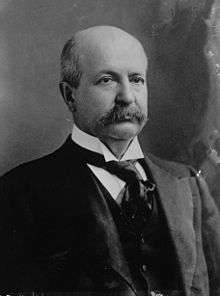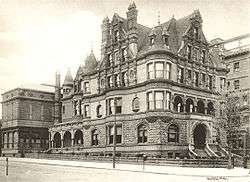Peter Arrell Brown Widener
| Peter Arrell Brown Widener | |
|---|---|
 | |
| Born | November 13, 1834 |
| Died |
November 6, 1915 (aged 80) Elkins Park, Pennsylvania |
| Resting place | Laurel Hill Cemetery |
| Residence | Lynnewood Hall |
| Occupation | Businessman, art collector, philanthropist |
| Known for | Co-founder Philadelphia Traction Company, U.S. Steel, American Tobacco |
| Religion | Episcopalian |
| Spouse(s) | Hannah Josephine Dunton (1836-1896) |
| Children |
Harry (1859-1874) George Dunton (1861-1912) Joseph Early (1871-1943) |
| Parent(s) | Johannes & Sarah Fulmer Widener |
| Relatives |
Grandchildren: Harry Elkins Widener (1885-1912) George D. Widener, Jr. (1889-1971) Eleanor Widener Dixon (1891-1953) Peter A. B. Widener II (1895-1948) Josephine "Fifi" Widener Leidy Holden Wichfeld Bigelow (1902-1961) Great-grandchildren: Fitz Eugene Dixon, Jr. (1923-2006) Joan Leidy Ray (1923-) Peter A. B. Widener III (1925-1999) Ella Widener Wetherill (1928-1986) |
Peter Arrell Brown Widener (November 13, 1834 – November 6, 1915) was an American art collector, businessman, and head of the Widener family of Philadelphia, Pennsylvania.[1]
Biography
A merchant who supplied meat to the Union Army during the United States Civil War, Widener grew to prominence in the city and by 1873 had become Philadelphia City Treasurer.[1] In 1883, he became very successful as a result of his investing in trolley cars and public transit systems as a founding partner of Philadelphia Traction Company, which expanded to other major cities in the United States. He and his Philadelphia business partner William L. Elkins invested in public transit systems in other major cities with businessmen such as Charles Tyson Yerkes, the streetcar czar of Chicago. Widener used the great wealth accumulated from that business to become a founding organizer of U.S. Steel and the American Tobacco Company as well as to acquire substantial holdings in Standard Oil. He is considered to have been among the 100 wealthiest Americans, having left an enormous fortune.[2]
Widener married Hannah Josephine Dunton (1836–1896), and they had three sons: Harry, George, and Joseph. In 1887 he built an ornate Philadelphia mansion at the northwest corner of Broad Street and Girard Avenue, although he vacated it 13 years later and donated it to the Free Library of Philadelphia as a memorial to his late wife. In 1900 he completed Lynnewood Hall in Elkins Park, Pennsylvania, a 110-room Georgian-style mansion designed by Horace Trumbauer. Widener was an avid art collector,[3] with a collection that included more than a dozen paintings by Rembrandt as well as works by then-new artists Édouard Manet and Auguste Renoir.
Widener's son, George Dunton Widener, and grandson, Harry Elkins Widener, died when they went down with the RMS Titanic.
Widener died at Lynnewood Hall at the age of 80 on November 6, 1915, after having suffered from poor health for three years.[1]
-

Peter A. B. Widener Mansion, Broad St. & Girard Ave., Philadelphia, PA (1887), Willis G. Hale, architect.
-

Lynnewood Hall, Elkins Park, PA (1897-1900), Horace Trumbauer, architect.
-

Peter A. B. Widener's Yacht Josephine later USS Vixen (PY-4)
See also
- Rhône (The) v. Peter A.B. Widener (The) (a barge named after Widener was involved in a collision in Canada, which became a noted court case)
- Widener University
References
- 1 2 3 "P.A.B. Widener, Capitalist, Dies. Traction and Tobacco Financier Expires at 80 at His Home in Elkins Park. Left About $35,000,000. Philanthropist and Patron of the Arts Began His Career in Philadelphia as a Butcher". New York Times. November 7, 1915. Retrieved 2012-10-02.
Peter A.B. Widener, capitalist and philanthropist, art collector and lover of children, who climbed from the humble station of a butcher to that of a leader in the world of finance, died today at his home, Lynnewood Hall, Elkins Park. Mr. Widener was 80 years old, and had been in poor health for three years.
- ↑ The Wealthy 100
- ↑ Levy, Florence Nightingale (1917). American Art Annual, Volume 13. MacMillan Company. p. 320.
External links
- Article on Widener and Widener Mansion in Philadelphia, PhillyHistory.org.
- Peter Arrell Brown Widener at Find a Grave
|